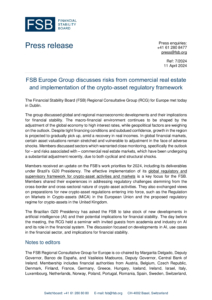Press enquiries:
+41 61 280 8477
[email protected]
Ref: 29/2024
The Financial Stability Board (FSB) Regional Consultative Group for Europe (RCG Europe) met on 14 and 15 November in Munich, Germany. The meeting was hosted by the Deutsche Bundesbank and Bundesanstalt für Finanzdienstleistungsaufsicht (BaFin).
On the first day, members participated in a workshop on the financial stability implications of private credit. Members discussed the drivers of growth of this form of credit and the benefits it brings to the broader economy. They also discussed the need to enhance understanding of potential risks, given limited data on the market, as well as existing regulations. A concentration of these schemes in the riskiest segments of the market exposes them to credit risk. Due to data gaps, lack of a secondary market to publicise valuations, and limited disclosure, it remains a challenge to monitor and understand the vulnerabilities of this sector.
Members discussed global and regional vulnerabilities in the financial system. They noted that long-standing vulnerabilities remain, including debt levels in governments, corporates and households. The spike in equity market volatility in August also signalled vulnerabilities in non-bank financial intermediation, an issue that the FSB has been discussing for a while. Geopolitical risk is likely to remain elevated, which warrants preparedness for heightened uncertainty and volatility, including in financial markets.
Another source of concern is operational vulnerabilities. Participants shared insights on how the global IT outage in July affected financial institutions in their region. On this note, they welcomed the FSB’s public consultation on a Format for Incident Reporting Exchange (FIRE) and its potential to address challenges arising from the need for financial institutions to report the same operational incident to multiple authorities.
The group took note of the findings of a recent FSB report highlighting the vulnerabilities related to a combination of solvency and liquidity risks in a high-interest-rate environment, and the role of technology and social media for depositor behaviour. Members discussed the implications of these factors and potential tools to address related challenges.
Finally, members discussed the FSB’s evaluation of the effects of the G20 financial regulatory reforms on securitisation. The FSB published a consultative report assessing the extent to which the reforms have achieved their objectives and the evolution of securitisation markets. Members discussed the effects of reforms in the European context and look forward to the FSB’s forthcoming final report.
Notes to editors
The FSB Regional Consultative Group for Europe is co-chaired by Soledad Núñez, Deputy Governor, Bank of Spain, and Vasileios Madouros, Deputy Governor, Central Bank of Ireland. Membership includes financial authorities from Austria, Belgium, Czech Republic, Denmark, Finland, France, Germany, Greece, Hungary, Iceland, Ireland, Israel, Italy, Luxembourg, Netherlands, Norway, Poland, Portugal, Romania, Spain, Sweden, Switzerland, Ukraine, United Kingdom and the Group of International Finance Centre Supervisors. The European Commission, the European Central Bank (ECB), the ECB Banking Supervision also attended the meeting.
The FSB has six Regional Consultative Groups, established under the FSB Charter, to bring together financial authorities from FSB member and non-member countries to exchange views on vulnerabilities affecting financial systems and on initiatives to promote financial stability.1 Typically, each Regional Consultative Group meets twice each year.
The FSB coordinates at the international level the work of national financial authorities and international standard-setting bodies and develops and promotes the implementation of effective regulatory, supervisory, and other financial sector policies in the interest of financial stability. It brings together national authorities responsible for financial stability in 24 countries and jurisdictions, international financial institutions, sector-specific international groupings of regulators and supervisors, and committees of central bank experts. The FSB also conducts outreach with approximately 70 other jurisdictions through its six Regional Consultative Groups.
The FSB is chaired by Klaas Knot, President of De Nederlandsche Bank. The FSB Secretariat is located in Basel, Switzerland and hosted by the Bank for International Settlements.
- The FSB Regional Consultative Groups cover the following regions: Americas, Asia, Commonwealth of Independent States, Europe, Middle East and North Africa, and sub-Saharan Africa. ↩︎
